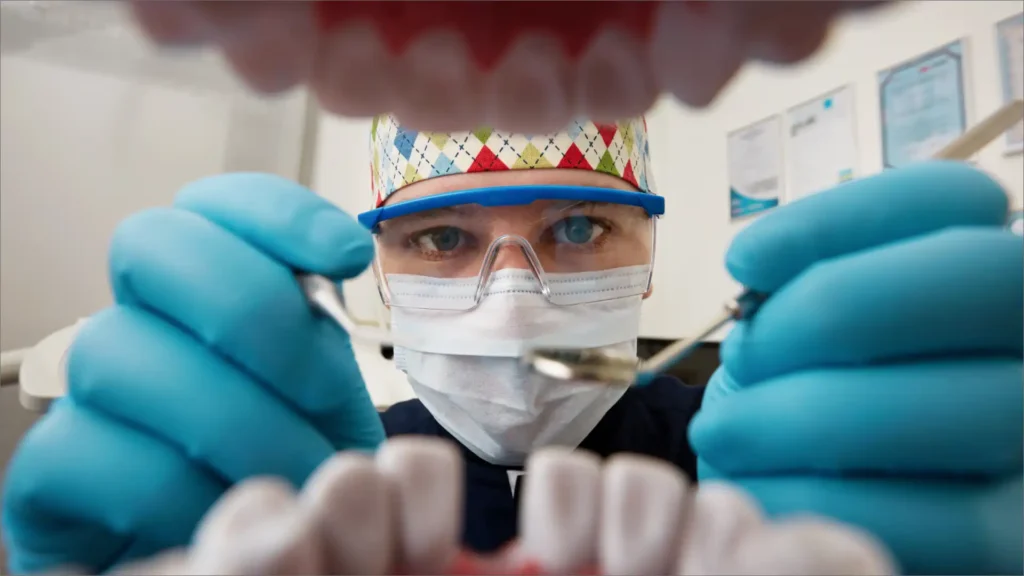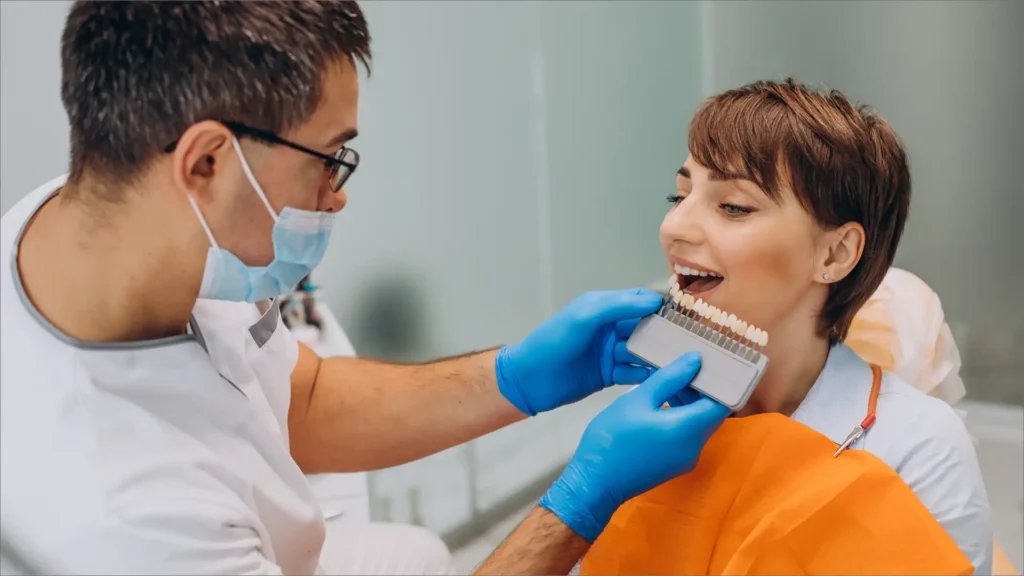Maintaining healthy teeth is essential for your well-being and goes beyond simply having a beautiful smile. As a reliable source of oral care information, we’re here to teach Austin locals everything they need to know about dental cleanings. By removing plaque, tartar, and stains, this crucial procedure helps to avoid gum disease and other severe tooth problems.
Supported by years of oral health research and professional insights, this article discusses the importance of dental cleanings and how they improve your health. Whether you’re new to Austin or just curious, we have trustworthy, understandable information for everyone.
What is Dental Cleaning?
A dental cleaning is a professional procedure that removes stains, plaque, and tartar from your teeth. Brushing and flossing once a day are important, but they’re not always enough. Only a dentist or hygienist can remove tartar formed when plaque hardens over time.
This procedure is not limited to maintaining your smile. It is essential for avoiding cavities, gum disease, and bad breath. Austin dentists frequently advise biannual cleanings to maintain the best possible oral health. However, what is the actual process? Let’s analyze it in detail.

Steps Involved in a Dental Cleaning
Every dental cleaning is a systematic yet easy procedure meant to keep your teeth and gums safe. What typically takes place during a procedure is given below:
Step 1: Initial Examination
A dental cleaning begins with the initial examination. The dentist or hygienist carefully examines your teeth and gums for symptoms of cavities, plaque, tartar, or gum irritation using a tiny mirror. This stage identifies areas of concern and guarantees that the cleaning procedure is customized to fulfill your unique oral health requirements.
Step 2: Scaling
Scaling is an essential dental cleaning step in which a dentist or hygienist uses specialized instruments to remove plaque and tartar from your teeth and gum line. This procedure keeps cavities, gum disease, and bad breath away. Scaling is mild, painless, and necessary for preserving oral health, although it may seem severe.
Step 3: Polishing
Polishing is a crucial stage in dental cleaning that makes teeth smoother and more radiant. The hygienist uses an electric brush and gritty toothpaste to remove surface stains, leaving teeth bright and less vulnerable to plaque buildup. In addition to improving your smile, this step supports long-term dental health .
Step 4: Flossing and Rinsing
Rinsing and flossing are crucial last procedures for oral hygiene. The hygienist carefully flosses between your teeth to remove plaque and debris from hard-to-reach areas. Fluoride or antibacterial solution rinsing removes loose particles and strengthens the enamel. Your mouth will feel clean and fresh after this step.
Step 5: Fluoride Treatment
Applying fluoride treatment after tooth cleaning is simple and painless. It strengthens enamel and increases its resistance to decay and cavities. Fluoride, which comes in gel, foam, or varnish form, coats your teeth in a protective layer. It is especially beneficial for adults and children susceptible to dental decay.

Benefits of Dental Cleaning
A brilliant smile is not the only benefit of dental cleaning. It serves as a starting point for improved general and oral health. Residents of Austin can benefit in the following ways:
i. Prevention of Cavities
Regular dental cleanings are the first step in preventing cavities. Plaque, the sticky substance that leads to tooth decay, is eliminated during these sessions. If not cleaned properly, the plaque turns into tartar, increasing the risk of cavities. Over time, dental cleanings keep your teeth healthy and decay-free by removing debris and strengthening enamel with fluoride treatments.
ii. Healthier Gums
A confident smile and general dental health depend on healthier gums. Routine dental cleanings reduce inflammation and prevent gum disease by removing plaque and tartar. Additionally, cleanings increase blood flow to the gums and keep them firm and pink. Gums in good health shield teeth and offer a solid foundation for lifetime smiles.
iii. Fresher Breath
One of the most obvious advantages of dental cleaning is fresher breath. Cleanings remove plaque, tartar, and trapped food particles, removing the bacteria responsible for bad breath. Your mouth feels clean and fresh after routine dental care, which increases your confidence in social and professional interactions.
iv. Early Detection of Oral Issues
Regular dental cleanings enable your dentist to detect oral health problems early on, including gum disease, cavities, and oral cancer. Early detection addresses issues before they worsen, saving money, time, and pain. This preventative measure protects your general health and keeps your smile brighter and healthier.
v. Improved Overall Health
Improved general health is linked with greater oral health. Regular dental cleanings reduce harmful germs, which lowers the risk of heart disease, diabetes, and respiratory problems. Gum health shields the body from inflammation that might affect other body parts. A clean mouth promotes a healthy immune system and a healthy feel every day.
Why Is Dental Cleaning Important?
Dental cleaning is important for preventing major health problems and is not meant for aesthetic reasons. For example, gum disease might result in tooth loss if left untreated. Additionally, oral germs can enter your bloodstream, raising your risk of heart problems.
Residents in Austin frequently indulge in wine, coffee, and barbecue due to their active lifestyle, which over time may stain teeth. Regular cleaning removes these stains, leaving your smile white and radiant. Furthermore, regular cleanings save money over time by averting expensive operations like extractions or root canals.
Choosing the Right Dentist in Austin
When it comes to dental care, choosing the correct dentist in Austin can make all the difference. The following suggestions will help you make an informed decision:
1. Look for Experience and Credentials
Choose a dentist with the appropriate certifications and a track record of experience. Verify that they have a license and have undergone specific training. A qualified dentist follows up with the most recent developments in dentistry and ensures safe, efficient procedures.
2. Read Reviews and Testimonials
Reviews and testimonials can provide vital information regarding a dentist’s reputation and patient experience. Look for professionalism, cleanliness, and staff friendliness to ensure you choose a reputable dentist clinic in Austin for your treatment.
3. Evaluate Their Services
A comprehensive dental care plan should include emergency treatments, cosmetic procedures, and regular cleanings. Most Austin clinics offer flexible payment plans and sedation dentistry to improve patient comfort and accessibility.
4. Consider Convenience
Austin’s hectic lifestyle means convenience is crucial when choosing a dentist. Choose a location close to your house or business to save time. Additionally, scheduling can be less stressful and easier with flexible hours, such as weekends or evenings.
5. Ask About Technology
Modern dental practices in Austin generally use advanced technologies of digital X-rays, 3D imaging, and ultrasonic scalers. These instruments offer faster, more relaxing cleanings with accurate results. When selecting a dentist, inquire if they employ technology to improve treatment.
Final Words – Dental Cleaning in Austin
Maintaining a bright, healthy smile and avoiding major oral health problems require regular dental cleaning. Regular cleanings not only safeguard Austin people’s teeth and gums, but they also contribute to their overall health. By understanding the procedure, advantages, and necessity of dental cleanings, you may make informed choices for your oral care.
Remember that selecting a dentist with proper training and cutting-edge technology can make all the difference. Make an appointment for your next dental cleaning to start the journey of your ideal oral health!
Read More: How Much Does a Dental Cleaning Cost at the Clinic in Austin, Texas?

